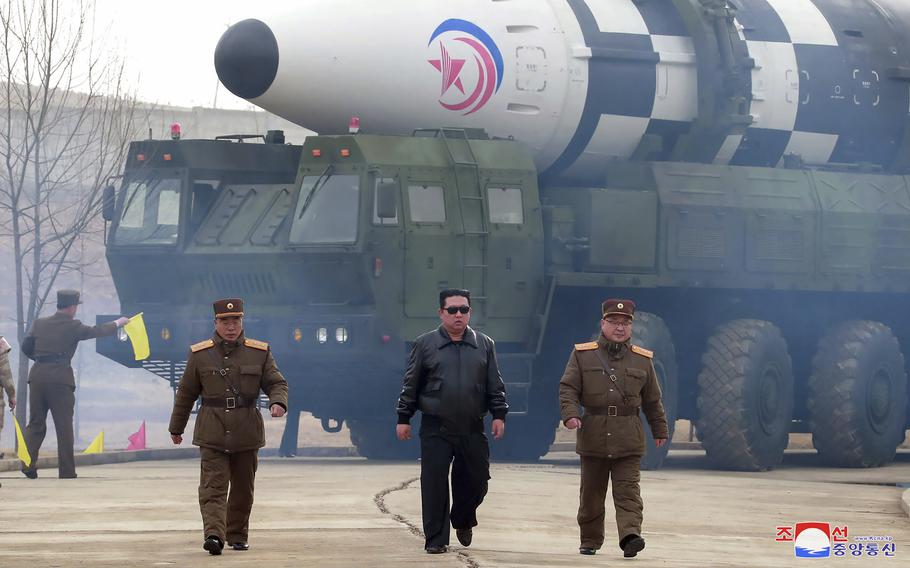
North Korean leader Kim Jong Un, center, walks near what state media says is a Hwasong-17 intercontinental ballistic missile on the launcher at an undisclosed location in North Korea in March 2022. (Korean Central News Agency)
TOKYO — Donald Trump in his second term as president is likely to accept North Korea as a nuclear weapons state and ask for more defense spending by America’s Asian partners, a Japanese foreign policy expert told reporters Thursday.
Those close to Trump see no hope of denuclearizing North Korea during his second term, according to Meikai University professor Tetsuo Kotani, a senior fellow at The Japan Institute of International Affairs.
“According to President-elect Trump, he’s going to recognize that (nuclear weapons power) status for North Korea so that he can bring North Korea to the negotiation for nuclear arms control,” Kotani, an expert in international relations, said in translated remarks during an online conference at the Foreign Press Center Japan.
Recognized nuclear states include the U.S., Russia, Britain, France and China, all signatories to the Treaty on the Non-Proliferation of Nuclear Weapons. North Korea signed the treaty in 1985 but withdrew after testing its own nuclear weapons in 2003. India and Pakistan have declared their weapons but are not signatories, and neither is Israel, which is believed to have them.
U.S. negotiators will focus instead on limiting the North’s arsenal of intercontinental ballistic missiles that could reach the U.S. mainland, Kotani said. The North last tested an ICBM on Oct. 31.
Official recognition of North Korea as a nuclear weapons power will damage non-proliferation efforts, but without it Trump’s advisers think the North’s nuclear threat could be greater in 10-20 years, he said.
“The international community is faced with the question of what they should consider in the event that the United States officially recognizes North Korea as a country owning nuclear weapons,” he said.
Meanwhile, a Trump administration will seek to end conflicts in Ukraine and the Middle East and prioritize Asia, where China is seen as the greatest threat, he said.
“Trump’s security team is characterized by members who are hard-liners against China,” he said.
Trump’s cabinet nominations include China hawks Sen. Marco Rubio for secretary of state and Rep. Mike Waltz as national security adviser.
Trump advisers include members of the America First Policy Institute such as Keith Kellog, a retired Army lieutenant general and former national security adviser to Trump’s first vice president, Mike Pence, Kotani said.
The Trump administration may require Japan, Taiwan and the Philippines to increase their defense spending and buy more U.S. arms, he said.
Taiwan, for example, could be asked to increase its defense budget from 2.5% of gross domestic product to 3%, Kotani said.
“Defense of the first island chain is considered to be of high importance, therefore, for the defense of Taiwan itself, the U.S. is willing to be involved,” he said.
Japan’s newly elected Prime Minister Shigeru Ishiba is unlikely to establish the sort of personal relationship that his late predecessor Shinzo Abe had with Trump, Kotani said.
Japan could improve its relationship by investing in U.S. energy and buying more U.S. oil and gas. Japan and other allies may potentially invest in U.S. shipbuilding, which cannot keep up with the U.S. Navy’s requirements, he said.
The Trump administration is unlikely to alter plans to reorganize U.S. Forces Japan to strengthen the alliance as if faces a burgeoning China, he said.
Tariffs proposed for allies and friendly nations such as Japan can be seen as bargaining chips to open markets for U.S. products and reduce America’s trade deficit, Kotani said.
High tariffs on Chinese imports won’t be negotiable since the policy is aimed at bringing industry back to America, he said.
“He will promote full decoupling between the U.S. and Chinese economies, not just high-tech industries” he said, adding that he expects Trump to pressure allies and friendly countries to also decouple.